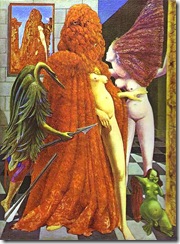
A well placed adjective can thoroughly change the meaning of a word. Some adjectives are so powerful that the the combined phrase becomes more significant than the noun the adjective modifies, leaving the unmodified noun seeming naked and weak without it. For instance, a cop is an important member of society, but a rogue cop is a thing of legend. An identity is good to maintain, but a secret identity is essential to maintain. A thief is a lowly member of society, but an identity thief is lower still. A secret identity thief is the lowest of all.
Then there are adjectives so overwhelming that they obliterate the word they modify, leaving none of the original meaning behind. A fallen angel, after all, is a devil, and a fair-weather friend is no friend at all.
I used to work for adjectives. You might have seen me on the side of the road holding a cardboard sign with words to that effect. I began my career as a junior developer, then worked up to being just a developer — which, although unmodified, was significant enough that it underscored the fact that "junior" was just a kind of slur. After developer came advanced developer, then expert developer, and finally senior developer. There are currently lots of senior developers around and very few junior developers, unlike the way it was back in the day. They all tend to wonder what comes after the adjective "senior". One can become an architect, of course, but the change of theme, and the fact that it is unmodified, merely serves to impress upon everyone that architects don’t actually do any coding. As a sort of gesture to make up for this damning through faint praise, an architect will occasionally receive a hyphenated title of developer-architect, which to my ear just makes things worse. After senior developer, one can also become a manager of course, much the same way a Jedi padwan can become a Sith lord, but this is a path of last resort.
Our Sith overlords could meliorate the situation by simply coming up with a new adjective, of course. I always thought awesome developer had a nice ring to it. Recent politics, besides revealing how our democracy really works, also inspired me with a different notion. The term super delegate left me wondering if super wouldn’t make a good modifier for the great developer. With repetition, we may be able to gentrify that somewhat wild modifier, super, and re-appropriate it from the comic connotations that have tended to diminish it. What better public identity is there for an über geek than super developer?
This morning, however, I was surprised to discover that there is something even more powerful in Democratic electoral politics than the super delegate. It is the undecided super delegate. Amazing, isn’t it, that not doing something can make a person more powerful than actually doing something? Rather than waste their potency by declaring for one candidate or the other, these undecided are able to curry special favor by simply not deciding, not declaring, not having an opinion one way or the other.
There is a tradition in the West that the undecided are in some sense the most contemptible beings, scorned by all sides. Before the gates of hell, Dante and Virgil encounter the third host of angels who neither sided with God nor with Satan, as well as those "who lived without or praise or blame," and perpetually lament their state. Virgil states harshly:
These of death
No hope may entertain: and their blind life
So meanly passes, that all other lots
They envy. Fame of them the world hath none,
Nor suffers; mercy and justice scorn them both.
Speak not of them, but look, and pass them by.
In the late Platonic school of Athens — alternatively known as the old school of Skepticism, or Pyrrhonic Skepticism –, on the other hand, this suspension of affirmation was considered a moral virtue, and was called the epoche (a term later appropriated by Husserl for Phenomenology). They found this suspension of belief so difficult, however, that they used ten argumentative tropes which they learned by heart to remind themselves that nothing should ever be asserted, lest they commit themselves to falsehood. The true philosopher, for the Pyrrhonic skeptic, is not one who speaks the truth, but rather one who does not speak falsehoods. Well into the modern era, one finds an echo of the Pyrrhonic tropes in Kant’s four antinomies.
Whether undecided super delegates are Pyrrhonists or Kantians I cannot say. I choose to withhold judgment on the matter since, after all, the real intent of this post is simply to congratulate two of my colleagues in the Magenic Atlanta office on their promotions. Through hard work and natural talent, Todd LeLoup and Douglas Marsh are now both Senior Consultants. With such adjectives we give public praise to the good and the great among us.
Where I work, "Senior" is an adjective that promotes people without adding anything to their wages. The adjective functions as the compensation.
It is an honorific without privileges!
Andrew,
Sure, but it looks great on your resume. In one company I was at, we used "Tech Lead" for the same purpose. No compensation, but at least you got a larger work burden and greater responsibilities (read: if this doesn’t work, we’re blaming _you_).
James
From the statements and discussion on Adjectives for the Good and the Great you might need to do a further item. There are a number of items outstanding from my most recent perusal.Keep the articles arriving. As the terminator said I will be back.